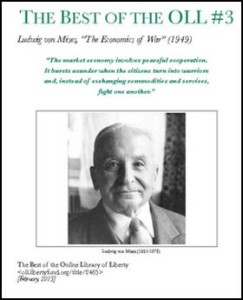 The Best of the Online Library of Liberty (BOLL) is a collection of some of the best material in the Online Library of Liberty. They are chapter length extracts and have been formatted as pamphlets for easier distribution.
The Best of the Online Library of Liberty (BOLL) is a collection of some of the best material in the Online Library of Liberty. They are chapter length extracts and have been formatted as pamphlets for easier distribution.
They are also available in epub format.
These extracts should be useful in the classroom, discussion groups, or material for a literature table for outreach. Each extract begins with a brief bio of the author and a brief discussion of why the text is important. Links to the full book from which the extract came and further reading are provided at the back. The most important passges in the extract are highlighted as pull quotes.
These extracts, along with our thematic collection of Quotations about Liberty and Power, provide an excellent introduction to the classical liberal and free market traditions [see below for details].
The first set of ten have been put online and include the following:
- The Best of the OLL No. 1: John Locke, “Of Property” (1698)
- The Best of the OLL No. 2: Vicesimus Knox, “The Prospect of Perpetual and Universal Peace” (1793)
- The Best of the OLL No. 3: Ludwig von Mises, “The Economics of War” (1949)
- The Best of the OLL No. 4: Ludwig von Mises, “Liberty and Property” (October, 1958)
- The Best of the OLL No. 5: John Stuart Mill, “Of the Limits to the Authority of Society over the Individual” (1859)
- The Best of the OLL No. 6: David Hume, “On Government” (1777)
- The Best of the OLL No. 7: Adam Smith, “On Free Trade” (1776)
- The Best of the OLL No. 8: Jean-Baptiste Say, “Of the Right of Property” (1819)
- The Best of the OLL No. 9: Sir William Blackstone, “Of the Absolute Rights of Individuals” (1766)
- The Best of the OLL No. 10: James M. Buchanan, “The Threat of Leviathan” (1975)
- The Best of the OLL No. 11: William Graham Sumner, “The Conquest of the United States by Spain” (1898)
(Indianapolis: Liberty Fund, 2013)
On David Hart’s personal website you also have a number of resources on the history of the classical liberal tradition : //davidmhart.com/liberty/Guides/ClassicalLiberalism/index.html



Laisser un commentaire